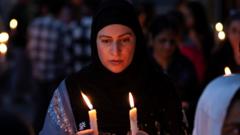In a troubling surge of violence and harassment, Kashmiris in India are grappling with a deepening crisis of identity. The latest incident occurred in Mussoorie when two Kashmiri shawl sellers, Shabir Ahmad Dar and his colleague, were assaulted by members of a Hindu nationalist group. This attack followed a deadly incident in Kashmir, where militants killed 26 civilians, and signs of retaliation against Kashmiris have emerged thereafter. Dar noted, "They blamed us for the attack, told us to leave town and never show our faces again," reflecting the pervasive fear among Kashmiri vendors who have lived in Mussoorie for decades.
Despite a keen appreciation for their craft—pashmina shawls embodying Dar’s rich cultural heritage—his goods now lie unsold due to escalating safety concerns. Local authorities have been criticized for their lenient handling of the incident, charging those responsible a small fine and requesting apologies instead of pursuing serious action. This incident has triggered mass fear, prompting many Kashmiris to abandon their long-standing businesses and return home.
In the wake of the attack, disturbing patterns of harassment and discrimination have emerged across Indian cities. Reports indicate that students and vendors face threats not only from right-wing groups but also from the very people with whom they share daily life. Such acts of aggression have forced countless individuals to flee their homes, with students like Ummat Shabir recounting experiences of being labeled as "terrorists" and physically removed from public transport.
The response from authorities has been swift, with increased security operations and detentions in regions populated by Kashmiris. Critics argue that these actions represent a form of collective punishment against innocent civilians, a sentiment echoed by former leaders who urge the distinction between militants and law-abiding individuals.
Notably, the backlash against Kashmiris feels unprecedented this time. Shafi Subhan, a shawl seller, has noted that despite past incidents of violence, he has never felt as vulnerable as he does now. "The public just stood and watched when our colleagues were attacked," he lamented, signaling a painful emotional fracture between Kashmiris and their Indian counterparts.
Meanwhile, in Kashmir, residents navigate life under an ominous security blanket, with many fearing that heightened military presence will only exacerbate tensions. The intolerable identity crisis has left civilians with the grim reality that safety is becoming increasingly elusive. Echoing this despair, daily wage worker Mohammad Shafi Dar detailed the devastating aftermath of a home demolition by security forces, stating, “We lost everything,” further encapsulating the plight of Kashmiris trapped in violence and conflict.
The narrative around Kashmir continues to evolve, revealing an unyielding cycle of grievance and fear. Protests have emerged in solidarity against the recent attacks, highlighting the community's yearning for peace. Yet, as long as the specter of violence looms over them, Kashmiris seek a resolution to their plight, caught in a web of societal prejudice, political rhetoric, and the quest for their rightful sense of belonging and safety in India.




















